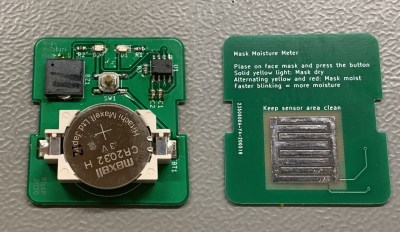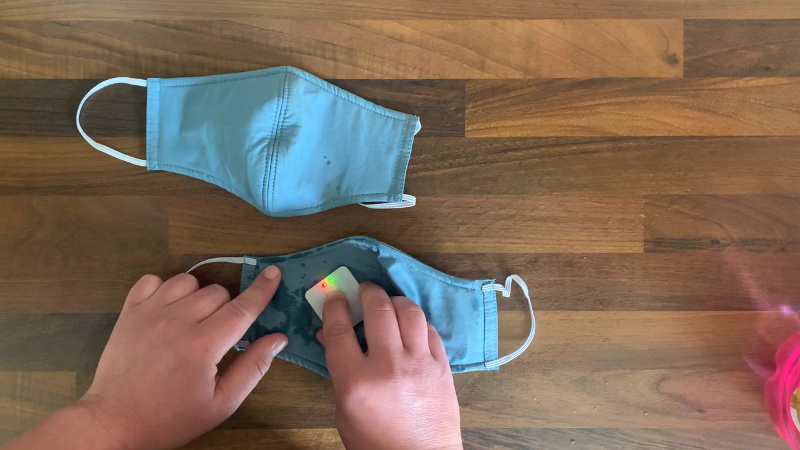The realities of wearing a mask when you go out, from forgetting the thing in the car to dealing with fogged up glasses, have certainly taken some getting used to for most of us. But not every issue is immediately obvious. For example, experts say that as a mask gets damp from exhalation or perspiration it becomes less effective. Which is precisely why [Rick Pannen] has designed the Mask Moisture Meter.
 As deep as we are into the Microcontroller Era, we really appreciate the simplicity of this design. It’s just a 555 timer, a buzzer, some LEDs, and a handful of passive components to get them all talking to each other. There’s no firmware or programming required; just put a fresh battery in the holder and away you go. The traces of the PCB serve as a moisture detector, so when the board is pushed against something wet enough, the red LED and buzzer will go off to warn the user.
As deep as we are into the Microcontroller Era, we really appreciate the simplicity of this design. It’s just a 555 timer, a buzzer, some LEDs, and a handful of passive components to get them all talking to each other. There’s no firmware or programming required; just put a fresh battery in the holder and away you go. The traces of the PCB serve as a moisture detector, so when the board is pushed against something wet enough, the red LED and buzzer will go off to warn the user.
Now admittedly, there’s a point where you certainly won’t need an electronic gizmo to tell you a mask is wet. But as [Rick] demonstrates in the video after the break, the circuit is sensitive enough to indicate when there’s moisture in the material that might not be immediately obvious to the eye.




















Use ENIG on the “sensor” if you want some level of corrosion resistance. Last thing you want is some electrolysis with solder at a wet spot on the mask as the metal can leech out. You don’t want it on your face.
you’re concerned of a few atoms of tin on the fabric?
Jep, it‘s mentioned that in the readme on the git repo. I just did the prototypes with the cheapest PCB option to see if it‘s working ;)
I did something very similar way back. It was for underwear though. Used that a lot until I got caught.
@Somun, your comment bears just enough information to come to two conclusions – but which one is it?
Are you a good dad?
Are you a pervert?
Are you both?
What this world needs, is “a good 5 cent” ionozing mask that is like a micro bug killer. Mesh of V fine wires, ultra low I, high V, so it can handle a sneeze over 100ms, but aside from such a burst, ought to be a mere ma, max. A maskless mask. I’m sure Vadar would agree.
I approve
Would it work in a diaper?
It’s very hard to breath in a diaper.
A “used” one for sure!
The article stated: “as a mask gets damp from exhalation or perspiration it becomes less effective” but provided no link as “proof”. I googled that phrase and got a CDC article here: https://www.cdc.gov/coronavirus/2019-ncov/prevent-getting-sick/cloth-face-cover-guidance.html That article only mentions that masks are harder to breathe through when wet, not that they become less effective. I expect the opposite — masks are more effective filters when wet (at least to block toxins in fire-related smoke). Before Covid-19 hit, there were some articles that indicated humidity levels higher than 62% could kill influenza virus, but I never saw any references to real analyses for that, so I expect it’s no more than urban legend or just more of the rampant unsupported claims that circulate so much these days.
Granted, the CDC has lost some cred recently due to bowing to Trumpian pressure to make some procedural changes that may enhance reelection chances).
Maybe embed antimicrobial nanoparticles of silver into masks, but that causes environmental pollution.
Wetting might interfere with charge on the mask fibers (for those with synthetic fibers – like N95, surgical masks), making them less effective.
There is certainly a lot of data on sterilizing N95 masks – and a lot of methods which do not work.
Plase = Please place?